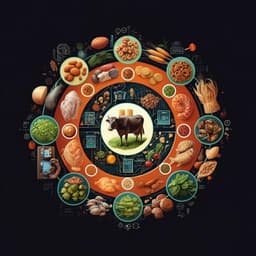
Environmental Studies and Forestry
A systematic review of the definitions and interpretations in scientific literature of 'less but better' meat in high-income settings
K. R. Sahlin and J. Trewern
The global food system generates diverse environmental and social pressures. Meeting planetary boundaries while ensuring adequate, nutritious food for all requires production improvements, food waste reduction and dietary transformation. Rising incomes, urbanization and dietary Westernization have increased global meat consumption from 23 kg per person in 1961 to 43 kg in 2018, with high-income countries needing drastic reductions. Substantial literature compares environmental impacts of meats versus other foods and of different diets, yet the magnitude of needed reductions and how to achieve them remains debated across academia, media and policy. The concept of eating and producing 'less but better' meat has been proposed as a more politically feasible strategy than meat reduction alone. However, clarity is lacking regarding how much 'less' entails and what constitutes 'better', as this depends on which sustainability aspects are prioritized, local context, and desired food-system outcomes. This study conducts a systematic review of peer-reviewed literature to analyze uses, definitions, and interpretations of 'less but better' meat, focusing specifically on this concept rather than the broader livestock sustainability literature.
The review followed PRISMA guidelines. The authors did not preregister a protocol (e.g., PROSPERO) as the review does not evaluate intervention effectiveness or diagnostic accuracy. Eligibility criteria included: focus on meat consumption or livestock production; explicit mention of 'less but better' or 'less and better' in title, abstract, or main text; inclusion of an explicit or implicit definition; peer-reviewed English-language articles published from 2000 onward with full text available online. Exclusion criteria included: general sustainable diet focus without explicit meat focus; absence of the terms; operationalization studies without defining the concept; non-English; pre-2000; theses, patents, books, or inaccessible full texts. Information sources were Scopus, Web of Science, and Google Scholar searches conducted on 2 June 2021 using the query: 'meat' AND 'less but better' OR 'less and better', limited to peer-reviewed, English, 2000–present. The initial search returned 818 records. After removing 114 duplicates, 704 records were screened by title and abstract, excluding 616. Eighty-eight full texts were assessed; 35 studies met inclusion criteria (with an additional paper used as the basis for coding framework but not counted among the 35). Both authors independently screened and resolved discrepancies via discussion to reduce selection bias. Data extraction and coding were performed manually in Microsoft Excel and Word. An initial deductive code set (37 codes) based on prior work was augmented inductively with 24 codes after coding four randomly selected articles. The coding framework was refined through comparison and discussion and then applied to all 35 papers. Thematic analysis grouped coded text to analyze definitions, interpretations, and narratives. Quantifications of 'less' were normalized to grams of meat protein per person per day assuming 20% protein content, with details in Supplementary Information. Tables summarized concept definitions, sustainability themes, and production systems. Risk of bias assessment of included studies was not applicable given the review’s aim to synthesize narratives; internal bias was mitigated through independent coding, discussion, and a combined deductive-inductive approach. The authors note that limiting searches to English may omit relevant materials in other languages; however, English predominates in regions where the concept is most relevant.
- Corpus and focus: 35 studies met inclusion criteria. Two-thirds (n=24) were published between 2018 and 2021, predominantly authored in Europe, the United States, or Australia, indicating concentration in Western, high-income contexts. Most focused on consumption (n=23), some spanned both production and consumption (n=11), and only one focused primarily on production.
- Definitions: Most articles (n=22) defined 'less but better' within their study context; 13 cited definitions from other sources. Broad agreement existed that 'better' meat should deliver positive outcomes for animal welfare, human health, and environmental sustainability, but explicit links between specific farming practices and these outcomes were seldom made. Outcome-based definitions of 'better' were more common than practice-based ones.
- Quantifying 'less': All papers referenced the need to reduce consumption, but only eight quantified 'less'. Quantifications varied in scope and units; when standardized, recommendations ranged roughly from 9 to 105 g per capita per day (variously referring to meat protein or broader categories). One study provided an absolute boundary based on 'ecological leftovers', suggesting 9–23 g per capita per day of animal-sourced protein (including milk and eggs), covering 16–42% of average daily protein requirements. Many studies did not specify meat types or whether weights were slaughter or cooked, affecting interpretation.
- Interpreting 'better': Frequently cited themes included climate impact (lower carbon footprint), land use (e.g., grass-fed minimizing feed-food competition), and animal welfare. Eating quality was discussed in eight studies, with two linking it to animal welfare. Trade-offs were highlighted: e.g., substituting beef with chicken may lower emissions but raise feed-food competition and animal welfare concerns and potentially reduce eating quality; grass-fed beef is often more emissions-intensive per kilogram product but may provide co-benefits in other domains.
- Underrepresented sustainability themes: Biodiversity was often mentioned but seldom used as a criterion for 'better'. Health/nutrition aspects of 'better' were limited (e.g., fat content, air quality impacts); digestibility, iron, and vitamin B12 were not discussed. Freshwater use and eutrophication each appeared in only three papers. Views on hormones, antimicrobials, and GMOs ranged from negative (public health concerns) to positive (efficiency). Social and economic dimensions were largely absent: no articles addressed worker well-being, working conditions, or governance. Some mention was made of maintaining rural landscapes, social acceptability, protecting farmer livelihoods, and the importance of local producer–consumer relationships.
- Farming systems associated with 'better': 24 articles referenced specific systems (e.g., organic, pasture/grass-fed, extensive, small-scale, free-range, agroecological, regenerative), reflecting a dominant narrative that 'better' meat comes from extensive, local, mixed systems with low external inputs. The 'land sharing' vs 'land sparing' debate was noted, with both approaches likely requiring 'less' meat to mitigate trade-offs.
- Systems perspective: Only two studies addressed system-level aspects (e.g., beef from dairy herds as a potentially better option considering climate and resource efficiency; implications of industrialized, globalized livestock concentration and the potential benefits of localized, circular systems).
- Interactions between 'less' and 'better': Three narratives emerged: (1) 'less' as prerequisite for 'better' (e.g., reducing animal numbers to improve standards for remaining animals); (2) 'less as better' (prioritizing consumption reduction, with production improvements secondary); and (3) 'better without less' (sustainable intensification lowering footprints per unit, permitting unchanged consumption). The third risks greenwashing and neglects the necessity of reducing high-income meat consumption to meet climate goals. 'Less and better' can identify trade-offs and potential win–wins but requires coherent multi-scale strategies.
The review shows the 'less but better' concept is increasingly invoked in high-income contexts but lacks coherent, operational definitions. While there is consensus that 'better' should span environmental sustainability, animal welfare, and health, the literature often fails to connect specific practices to measurable outcomes, and many sustainability themes—particularly social and economic—are overlooked. Quantifications of 'less' are scarce and inconsistent, hindering comparability and policy relevance. Divergent narratives about coupling or decoupling 'less' and 'better' reflect broader tensions between sustainable intensification and nature-based or extensive approaches; without explicit coupling, 'better' risks serving as a veneer for business-as-usual. The concept faces critiques for shifting responsibility to consumers and depoliticizing structural issues in capitalist agrifood systems. Nonetheless, 'less but better' may be more acceptable to consumers than outright avoidance, especially when combining reduced quantity with higher perceived quality, though price, taste, and demographics constrain uptake. Importantly, 'less but better' is context-dependent: while appropriate for overconsuming, high-income regions, it is not suitable where diets are nutritionally inadequate ('more and better' may apply). Achieving meaningful change requires policy and market mechanisms—labeling, price premiums, fair payments for public goods, and diversification of farm incomes—to enable adoption at scale and to distribute responsibility across the value chain.
Use of the 'less but better' meat concept is growing in English-language scientific literature, especially in Western, high-income settings. However, there is no consensus on how much 'less' is needed, with few studies providing transparent, comparable quantifications; where quantified, substantial reductions from current consumption are implied. Definitions of 'better' lack clear, agreed principles and often omit key sustainability themes, especially social and economic aspects, and rarely link specific practices to desired outcomes across scales. To make the concept actionable for policy and industry, future work should: (1) provide clear, transparent, and comparable quantifications of 'less' (ideally spanning all animal-sourced foods); (2) develop principles or best-practice guidelines that connect farming practices to outcomes across environmental, animal welfare, health, and socioeconomic domains; and (3) co-create a shared, multi-stakeholder vision of future livestock systems delivering improved outcomes across multiple indicators. Such advances are necessary for 'less but better' to guide decision-making and deliver desired food-system outcomes.
- Scope and language: The review was limited to English-language, peer-reviewed literature from 2000 onward, likely omitting relevant studies in other languages; most included studies were from Western, high-income contexts, limiting generalizability to other regions.
- Conceptual heterogeneity: Included studies used varied scopes, units, and definitions for 'less' and 'better', constraining comparability and synthesis.
- Narrative focus: The review synthesizes narratives and did not assess the effectiveness or quality of interventions; no formal risk-of-bias assessment of included studies was undertaken (deemed not applicable to aims).
- Evidence gaps in included literature: Few studies quantified 'less'; links between specific production practices and outcomes were seldom evidenced; social and economic sustainability aspects were largely absent; system-level analyses were rare. The implications for producers and value-chain actors were underexplored.
- Protocol: No prior registration (e.g., PROSPERO), though methods followed PRISMA and used independent screening and coding to mitigate internal bias.
Related Publications
Explore these studies to deepen your understanding of the subject.







